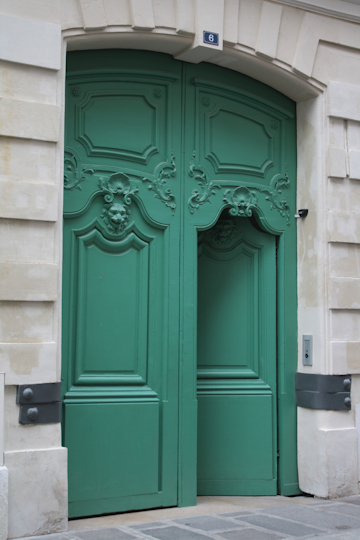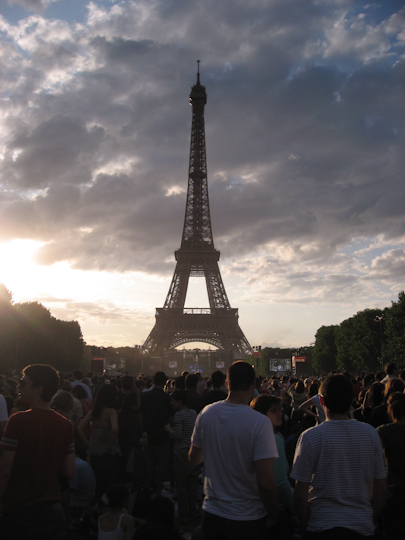Are Parisians really rude? The answer is yes… and no. In France, despite the saying Le client est roi (“The client is king”)[1], even Parisians complain about their fellow residents’ behavior from time to time. But once you learn some basic rules, I guarantee that any negative experiences will be fewer and farther between.
Below is my list, which has been reviewed, tweaked and approved by some very kind Parisian friends (Merci!). As an American, I’m allowed to say that much of this is directed at my fellow compatriots, but I am certain there are others out there (I won’t name names) who could benefit from a few of these tips as well. Most of it just comes down to looking around before you act. Observe what others are doing and try to do the same.
1. When you walk into a store or restaurant or before you even think of asking anyone anything, be sure to make eye contact with anyone and everyone who may work there and say Bonjour, Monsieur, Bonjour, Madame or Bonjour, Mademoiselle (and preferably select appropriately among those three options).
2. Always apologize if you are interrupting someone, even if you think you are quite justified in doing so. Just because the shop keeper is talking to her boyfriend on the phone about the movie they saw last night while you are trying to pay for your flu medication, you are still the rude one for interrupting. Even if you are not interrupting, it is best to be humble when asking for something. It is never a bad idea to throw in a Je suis desolé(e), mais… (“I’m sorry, but…”) immediately after your Bonjour, Monsieur/Madame/Mademoiselle.
3. Be sure to say Au revoir and perhaps a Bonne Journée (“Have a good day”) as you are leaving a shop or restaurant. If you have purchased something, it’s their job to thank you. If you have not spent any money there, it’s your job to say Merci, Monsieur/Madame/Mademoiselle. But as a general rule, I err on the side of caution and always say Merci, Monsieur/Madame/Mademoiselle. Au revoir et bonne journée, as I am leaving any premises.
4. Lower your voice. Look around you, and if everyone else in the restaurant or in your train car (and certainly in the quiet car) is speaking much more softly, do the same. (But don’t cave into the jerks who shush you just because you’re speaking in English – that has been known to happen.)
5. Servers in French restaurants will not bring the check until you explicitly ask for it. Just saying “No, nothing more,” “I’m all set,” or “No, no coffee, no dessert” is not sufficiently explicit. So don’t think the server is rude until you have asked for l’addition s’il vous plaît and even then, be patient. Alternatively, you may go to the counter and ask for the bill if you are in a rush or the restaurant is crowded.
6. Tipping: 15% tip is always included in the final bill although it is customary to round up. I would generally round up to the nearest euro for a table-service meal under €15, leave one euro per person for meals €15 to €30 or so and leave closer to €2 per person (but with a maximum of €5 total) for a meal over €30 per person. Some French are fine with leaving no tip. I prefer not to give the French more fodder for thinking Americans are rude.
7. Look around before you grab. In some shops (at the fruit vendor and many outdoor markets for example), the shopkeeper will pick the products for you (at your direction). Look at what others are doing before you start filling your basket.
8. Never put your feet up on anything. I oftentimes see people putting their feet (shoes or not) up on the seat across from them on a train or on the metro. If you do this, you will be sure to get a glare of death from someone. It’s tempting sometimes, but don’t do it.
9. Dress appropriately for restaurants, or even for walking down the hallway of your hotel or apartment building if you want to fit in. Shorts, baseball caps and running sneakers are generally frowned upon. White socks are a dead giveaway that you are American (as well as a faux pas for most Parisians). That being said, jeans are almost always OK, with a decent top. On a couple of occasions I did sneak off to the movies practically in PJs under my big winter coat. And I never saw the logic in dressing up to walk 10 minutes to the gym so I could get changed into my gym clothes at the gym. OK, I admit that I have even been to my favorite sandwich shop, Cosí, after a run, still in sweaty running clothes. But I do so fully aware that I will get stared at and I will likely offend someone. (Something about paying a large sum in taxes to la République and to the 6th arrondissement made me stop caring as much what the “real residents” though of me.)
10. Never ever ask for a doggie bag. Some restaurants might try to indulge you, but they will be either annoyed at you or delighted at the laugh you have allowed them at your expense.
11. Be defensive (and maybe even a bit offensive) when waiting in line. If you are not on the ball, using elbows and other appendages creatively, someone will cut in front of you. And you will have no one to blame but yourself. This is all the more true in the metro, where someone will undoubtedly try to push past you as passengers are attempting to exit the train.
12. As I mentioned above, be patient. Keep in mind when dining out that French servers are usually waiting on far more tables than American servers are. And do not get mad when the server does not bring your coffee with your dessert: in France, coffee is served after dessert, unless you explicitly ask for it at the same time. (On that note, do not get mad when the server does not bring milk with your coffee: in France, a café is basically an espresso.) And keep in mind that in a shop, post office or wherever you may be waiting, twiddling your thumbs anxiously, the pace in Paris is slower than the pace you might be accustomed to. It won’t help to hurry someone. It will only make it worse. (I’m still working on this one myself.)
13. If you do not speak some French already, take the time to learn a few key words and phrases. Even if you are traveling with someone who speaks French and can do the talking for you, you will be seen as rude if you cannot at least say your “please” and “thank you”s. At a minimum, try to learn:
- Bonjour, Monsieur/Madame/Mademoiselle = Hello/Good day
- Bonsoir, Monsieur/Madame/Mademoiselle = Good evening
- Au revoir = Goodbye
- Bonne journée = Have a nice day (as you are departing)
- Bonne soirée = Have a nice evening (as you are departing)
- Merci, Monsieur/Madame/Mademoiselle = Thank you
- Excusez-moi = Excuse me (If you are interrupting someone or you would like to ask a question)
- Je suis desolé(e), mais… = I’m sorry, but…
- Pardon = Excuse me (as in “Get out of my way”)
- Parlez-vous anglais? = Do you speak English?
If you are feeling confident, it cannot hurt to add Monsieur/Madame/Mademoiselle at the end of any of the above.
14. Elbows on the table are actually OK in France, at all but the most fancy of occasions. Hands under the table in your lap, however, is seen as rude.
15. The French tend to eat almost everything (hamburger and pizza included, though not sandwiches) with a fork and knife. I still have not mastered European silverware-holding etiquette (fork “upside-down” in the left hand, knife in the right) but this earns me some confused and/or disgusted looks once in a while, especially when my knife inevitably slides off my plate and crashes to the floor when I have placed it down to switch my fork to my right hand to take a bite. Americans often also are accused of putting too much food in their mouths at once…. Stick to small bites!
16. The server will usually ask how you would like your steak cooked. Your choices are bleu (barely cooked at all), saignant (technically “rare” but by American standards, really rare), à point (technically “medium” but I would characterize it as medium-rare) or bien cuit (if you are following the pattern here, you can guess that this translates literally as “well done” but really it’s medium). In fact if you are like me and to the disgust of the French and even many Americans like only some pink in your steak, you should ask for vraiment bien cuit (“Yes, you can laugh at me, but you heard me correctly. I actually, truly, really want it well done.”) Aside from the bloodiness factor of your meat, it is best to let the French determine how best to prepare French dishes. If you have allergies or strong preferences, of course let the server know. But your visit to Paris is not the best occasion to start enforcing the low-calorie diet. Do not be overly picky or demanding. Recall also that gambas (shrimp) and langoustines (closest to our crayfish) will come unpeeled and with the heads on. Oftentimes fish is served whole, including the head and bones. If this is not your style, consider yourself warned.
17. Do not assume grass is meant to be walked on. It still saddens me to see an oasis of plush green grass and not be allowed to picnic on it. But if you see a sign that says pelouse interdite (a sign so common that someone even named a restaurant in its honor) or if no one else seems to be clobbering the little green souls with their merciless feet, avoid the lawn. This is most common in the winter when the pelouse may be au repos (getting its beauty rest).
18. Remember that bars and restaurants are required to give you free tap water upon request (une carafe d’eau = a jug of tap water / un verre d’eau = a glass of water). So do not be bullied into purchasing bottled water. Often if you just ask for water, the response will be “plat ou gaseuse?” (“flat or sparkling?”), which always means you will be charged. So insist on the carafe or the verre, but do not expect the water (or bread, or anything else that is free) to arrive as quickly as the paid items or without several reminders.
19. The French greet each other with deux bises (two kisses, one on each cheek). So do not freak out if someone moves in for the kiss (unless it’s landing somewhere other than your cheeks). Yes, it is normal and expected even between two men. Always start with the right cheek and two kisses only (never three or four in Paris – three and they will think you are from the north and four, even worse, they will think you are from the south). However, in a more formal business situation, a handshake is generally more appropriate. (That being said, between two people of the opposite sex, deux bises may still be proper even in a work context. Note that Nicolas Sarkozy always gives Angela Merkel deux bises.) It’s complicated, even for the French, so wait for the other person’s lead if you are not sure what to do.
20. Now I am worried that you are getting scared off. Relax, you do not need to tiptoe around. But to round it off, here is one last thought to keep in the back of your head: taboo topics. In France, it is not polite to ask someone about his or her political party affiliation or who he or she plans to vote for (even when everyone is talking about the upcoming elections). Also tread lightly if you find yourself in a discussion about wars: World War II, Algeria, Vietnam. These topics are not off limits, but be sensitive when discussing France’s involvement. I do not think it is appropriate in any culture to ask someone what his or her salary is, but it is especially taboo in France. Some French think it is rude to ask “What do you do?” Others find that wanting to know where a new acquaintance spends 35 hours per week is a perfectly benign and logical question. If you choose to ask, be sure not to imply that you are trying to assess your new buddy’s economic status. Finally, it may be seen as rude to ask someone about his or her relationship status. If the person wants to talk about it, he or she will. No need to ask.
***
Now that I have attempted to educate my compatriots in French politesse, could I just ask one favor in return of any French readers out there? When I am in France and speaking with you in French, please do not insist on carrying on your side of the conversation in English! Especially if my French is clearly better than your English! Please…. It’s rude!
[1] On Monday, January 21, 1793, King Louis XVI was beheaded by guillotine on the Place de la Révolution, now Place de la Concorde. According to Wikipedia:
Some accounts of Louis’s beheading indicate that the blade did not sever his neck entirely the first time. There are also accounts of a blood-curdling scream issuing from Louis after the blade fell but this is unlikely, since the blade severed Louis’s spine. It is agreed that while Louis’s blood dripped to the ground many members of the crowd ran forward to dip their handkerchiefs in it.





